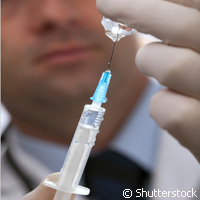EU-funded project gives boost to vaccine innovation
The development of new effective vaccines is a constant requirement in the global battle against life-threatening diseases. Yet innovative development is often hampered by problems such as the fragmentation of know-how and limited financial or intellectual means. But now a pan-European collaborative project that is in full swing aims to tackle these stumbling blocks head on. TRANSVAC ('European network of vaccine development and research'), which received a EUR 10 million funding boost under the 'Research Infrastructures' Theme of the EU's Seventh Framework Programme (FP7), brings together different actors in the vaccine development field so they can share expertise and work together on the creation of new accessible vaccines. As a collaborative infrastructure project, TRANSVAC, which started in 2009 and runs until 2013, is a joint effort between research and development (R&D) groups, assay developers and vaccine producers. Coordinated centrally by the European Vaccine Initiative (EVI), the main aim of the TRANSVAC project is to foster coordination between 13 independent partners based across Germany, the United Kingdom, the Netherlands and Switzerland. The TRANSVAC project, which is not focused exclusively on one particular disease, will lead to pioneering approaches and the realisation of 'tomorrow's vaccines'. Vaccination is one of the most cost-effective health interventions and has already contributed to the significant global decline of killer conditions such as polio, tetanus and measles. Now worldwide research efforts are focusing on diseases like malaria, which killed nearly 1 million people worldwide in 2008, according to World Health Organization (WHO) data. As well as being indispensible for global health, vaccine development is also a driver of innovation. The TRANSVAC infrastructure project will accelerate the pharmaceutical and clinical development of promising vaccine candidates by closing the gap between academic research and clinical trials through carefully managing the advancement of promising vaccine candidates from preclinical animal models to early proof-of-principle studies in humans. Although this expertise across many disease types already exists in Europe, there is currently very limited coordination among vaccine R&D groups, assay developers and vaccine producers. TRANSVAC hopes to join up these dots. One area of the project's focus will be improving our existing knowledge of adjuvants - immunological agents that can modify the effects of other agents like drugs or vaccines when added to a vaccine to stimulate the immune system's response. The project partners will also be looking at standardised reagents and assays, microarrays, animal models and protein characterisation and production. The knowledge developed is also accessible to external groups across Europe, which may apply to access services provided by the TRANSVAC partners free of charge; these include access to adjuvants, animal models, standardised reagents and assays, as well as powerful molecular analysis like deep sequencing and microarray analysis. There is currently an open call for free services in vaccine development that will close on 31 July 2011. The TRANSVAC project also focuses on the training side by developing the intellectual capacity to carry out vaccine development for many years to come. The next of these training sessions will be held in the Vaccine Formulation Laboratory at the University of Lausanne, a WHO collaborating centre based in Epalinges, Switzerland. Even though the TRANSVAC network was initially established with 13 partners, any European group is free to request membership, as long as it brings some relevant experience, facilities and resources to the table of course - in keeping with the collaborative approach of this project! The project partners are all unanimous on the ultimate aims of the project - a thriving European vaccine development network and a significant contribution to the eradication of some of the world's deadliest diseases.For more information, please visit:TRANSVAC:http://www.transvac.orgEuropean Vaccine Initiative (EVI):http://www.euvaccine.eu
Countries
Switzerland, Germany, Netherlands, United Kingdom



